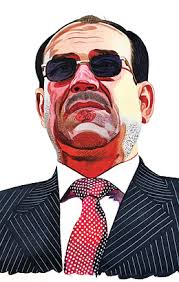Contrary to the popular narrative, Iraqi PM Nouri al-Malaki was not a sectarian leader. His fault was that he was an overly-ambitious autocrat who had the further misfortune of presiding over a fundamentally sectarian political system–and during the particularly polarized period in the Mideast which followed the Arab Uprisings.
And while deposing al-Malaki had been a key demand of the Sunni opposition (as well as the United States), it is critical to recognize that the prime minister met his end at the hands of the Shii alliance, who wanted him gone for their own reasons. It was not a response to the Sunni uprising, but an intra-Shii coup which had been in the works for some time:
Muqtada al-Sadr had long deemed al-Malaki a tyrant obsessed with consolidating power for himself at the expense of the Shii population; he had declared that al-Malaki’s tenure would end with the formation of the next government. Unable to prevent or deter al-Malaki from seeking a third term, al-Sadr’s alliance in parliament appointed a new PM from within the Prime Minister’s Dawa Party. Given that the party achieved a plurality of the vote (and al-Malaki was the party’s leader), they technically had the right to spearhead the formation of the next government rather than merely having someone appointed from within their ranks.
Moreover, al-Malaki had cultivated a good deal of loyalty with Iraq’s bureaucracy, military and intelligence services. He called these assets to the capital in his defense, pushing Iraq to the precipice of implosion: as long as these forces remained loyal, al-Malaki could have simply choose not to resign (an in situ coup)—or even deployed these assets against those who sought to depose him, effectively attempting to in earnest the transform into dictator he was often accused of being. At that point, driving him out would require an intra-Shii civil war in the capital, layered atop a wider inter-sectarian crisis raging across the rest of the country—it would have been the end of Iraq.
Fortunately, the prime minister was ultimately convinced to avail himself of the legal process instead—suing to overturn the appointment of his successor. However, given the lack of support within his own party, the bid was unlikely to succeed. As this realization finally sunk in, the embattled prime minister stepped down and accepted the candidacy of his successor, Haider al-Abadi.
But again, this whole drama played out within the Shii coalition.
Their opposition to al-Malaki was muted because of a concern with preserving their political bloc and presenting a unified front to the world—especially in light of the growing militancy in Sunni quarters. As a result, it was mostly Sunnis that were seen demonstrating against the government, allowing al-Malaki to cast the opposition as primarily sectarian and falsely claim he was promoting the national interests rather than his own.
This myth was enabled by media portrayals of the conflict as fundamentally sectarian—the idea that the prime minister had enraged and would be deposed by his own constituents did not fit the convenient Sunni v. Shia narrative, and so was never considered as a possibility. Nonetheless, as a matter of fact, al-Malaki was not deposed because he was too sectarian, but because he was not an effective agent of the coalition that empowered him.
This is not to say that the Shii are unconcerned with national unity—they definitely are. They perhaps have the most to gain or lose from the success or failure of the Iraqi state. Towards this end, the coalition has offered an emergency power-sharing government, but this is at best a stop-gap measure—and one which will likely prove unstable.
While willing to make concessions, the alliance is also very keen to maintain their overwhelming influence in the government and hold together their coalition—in part because Iraq’s Shii majority would outright reject any system which abolished their long-overdue sovereignty given the proceeding decades of oppression and ongoing underrepresentation and persecution throughout the region. It is also unclear who speaks for the Sunnis, and what measures would satisfy them at this point among the options their interlocutors are willing to consider.
One “solution” frequently touted is partition, but this would lead to profound tensions related to the distribution of critical resources and populations—exemplified by the civil wars embroiling Sudan and Libya. The resultant states would also be much weaker and more susceptible to outside influences. In the current climate, it is likely that regional and international players would patronize different factional powers and set them against one another in pursuit of their own geopolitical ends. Exacerbated by the inevitable aforementioned tensions regarding resources, the likely result would be a bloody and protracted civil war which further destabilized the region. It’s a bad idea.
There is no clear solution to Iraq’s crisis, especially with regards to U.S. policies. But it’s obvious what sort of actions are not helpful: self-righteous “I told you so” proclamations from the left, history defying blame-shifting from the right, scapegoating various Iraqi political actors, or compounding the problem with shortsighted “fixes” under pressure to “do something” or “show leadership.”
Instead, resolving Iraq’s political crisis will require nuance, care and painful concessions from all parties involved. It remains to be seen if there is a will or a way to accomplish this feat. If deposing al-Malaki was a step in the right direction, it was a small step at best.

